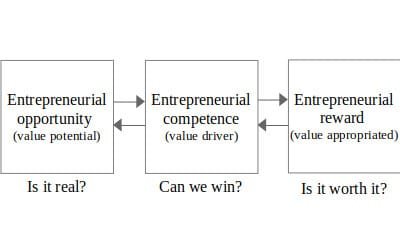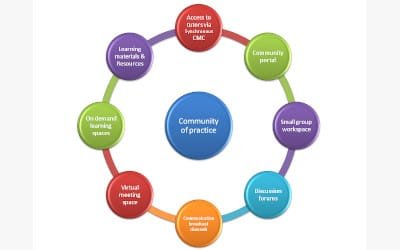Behavioural Theories and Entrepreneurship
Published in 2016

Introduction
I aim to dig deep into the cognitive and behavioural aspects that make up the entrepreneurial mindset. I want to figure out what sets entrepreneurs apart from others. Management and behavioural experts have delved into entrepreneurship extensively, and there’s a whole body of work on the topic (Barringer & Ireland, 2010). Lazear (2004) paints a broad picture, defining an entrepreneur as someone who starts a new venture. But that definition lumps together someone opening a small local business with giants like Jeff Bezos or Steve Jobs. Sure, there’s some truth there, but it’s tricky to draw general conclusions about entrepreneurship because it comes in so many shapes and sizes (Barringer & Ireland, 2010). Entrepreneurship research tackles big questions like why some people dive into entrepreneurial ventures while others with similar talents and energy don’t, and why some spot entrepreneurial opportunities while others miss them (Brockhaus & Horwitz, 1986). Researchers have been trying to tackle these questions using behavioural and cognitive theories. In this paper, I am going to dig into these two theories to see how well they explain the entrepreneurial mindset. I will look at Jeff Bezos and Amazon.com as a case study, testing how these theories hold up against the real-life growth of this legendary company that Bezos founded back in 1994.
Behavioural Theories
Behavioural theories have long been used by psychologists and behavioural specialists to understand and explain leadership, and more recently, they are being applied to entrepreneurship too.
The gist of the behavioural theory is that entrepreneurs have certain traits and characteristics that set them apart. Timmons et al. (1977) laid out 14 key behavioural characteristics that owners of enterprises tend to have, like self-confidence, energy, goal-setting ability, and a tolerance for ambiguity. These traits are said to contribute to their success.
But here’s the thing: while these traits are often associated with entrepreneurs, they’re not exclusive to them. Successful managers in large organizations can possess many of these same qualities. So, the behavioural theory isn’t the best at pinpointing what makes entrepreneurs unique.
Further research by Dyer et al. (2008) sheds some light on this. They found that truly innovative entrepreneurs stand out in how they gather information. They’re always asking questions that challenge the status quo, keen observers of their surroundings, not afraid to experiment, and they actively seek out diverse networks to bounce their ideas off. These behaviours help them come up with fresh ideas and solutions.
My study of Jeff Bezos, the mastermind behind Amazon, uncovered an interesting fact: Back in 1994, Bezos noticed that the internet was growing at an astonishing rate of over 2000% a year. So, he did something bold – he left his cushy Wall Street job to explore how he could ride this wave of online growth.
His first move was to create an online book exchange service. This allowed folks to swap used books, building a community of book enthusiasts in the process. Bezos didn’t just stop there; he tapped into this network to understand what book lovers really wanted (Brandt, 2011).
Now, while the behavioural theory hasn’t always had strong empirical support, Bezos’s story does seem to back up some of the claims made by Dyler and his team.
Cognitive Theory
While there hasn’t been much solid evidence supporting the idea that entrepreneurs behave differently from others, there’s a growing body of empirical research suggesting that there are cognitive differences between the two groups (Gustavsson, 2004). Researchers have been diving into various areas to explore this, such as heuristic logic, perceived connections and alertness, entrepreneurial expertise, effectuation, and cognitive biases (Gustavsson, 2004).
Heuristics
Research into cognitive differences suggests that the entrepreneurial mindset is closely linked to the use of heuristics and individual beliefs when making decisions (Palich & Bagby, 1995). Heuristics are essentially simplified strategies that people use to make decisions, especially in complex or uncertain situations where information is limited. According to Busenitz and Barney (1997), entrepreneurs rely on these heuristic processes for decision-making more than traditional business managers do. From my own investigation, it’s clear that cognitive processes vary widely among individuals (Palich & Bagby, 1995).
Moreover, among entrepreneurs, there’s a range of reliance on heuristics. The extent to which entrepreneurs lean on heuristic thinking, also known as entrepreneurial cognition, is influenced by their level and type of experience (McGrath & MacMillan, 2000). Experience provides entrepreneurs with mental frameworks for processing information, making it easier for them to sift through data and focus on what’s new or unique.
Researchers suggest that entrepreneurs’ main way of thinking is shaped by their past experiences (McGrath & MacMillan, 2000). Reuber and Fischer (1999) describe this as the dominant logic, which acts like a filter for an entrepreneur’s attention, helping them focus on relevant information. This dominant logic, closely related to entrepreneurial cognition, is a key part of an entrepreneur’s human capital. It plays a crucial role in identifying new insights about the environment and recognizing fleeting opportunities.
In contrast, new entrepreneurs often lack such mental frameworks and may feel overwhelmed by the abundance of information available to them (Sadler-Smith & Badger, 1998). These findings suggest that experienced entrepreneurs may possess cognitive traits that differ from those of new and inexperienced entrepreneurs
Perceived Connections and Alertness
Research on entrepreneurship has increasingly focused on the idea that some individuals are particularly keen at spotting new opportunities and coming up with fresh ideas (Miller, 2007). The ability to perceive and interpret information in a way that leads to unique conclusions about potential entrepreneurial opportunities seems to involve specific mental processes (Miller, 2007).
Being alert involves being attentive to new opportunities and requires distinct reasoning and thinking skills. However, empirical research on this topic is still limited, and more studies are needed to generate reliable empirical findings (Miller, 2007). Gaglio and Katz (2001) suggest that alertness is a reasonable and testable aspect of the cognitive processes involved in identifying opportunities. They argue that some individuals have cognitive frameworks that help them connect environmental changes, market trends, and niche markets, enabling them to recognize new opportunities more readily (Gaglio & Katz, 2001).
Entrepreneurial Expertise
Research on the differences in decision-making processes between entrepreneurs and others has explored the idea that entrepreneurs develop specific knowledge structures and process information differently from non-entrepreneurs (Krueger, 1993). Essentially, entrepreneurs have a unique ability to handle, store, retrieve, and utilize information compared to others. It seems that entrepreneurs possess expertise within their entrepreneurial domains, which they acquire through practice and experience (Krueger, 1993).
Moreover, there is growing evidence suggesting that cognition, through expert scripts, plays a crucial role in decision-making within entrepreneurship, even though there are limitations to rationality (Krueger, 1993).
Effectuation
The decision-making process under uncertainty typically begins with defining the desired outcome or the likelihood of its occurrence. Then, it involves figuring out the best ways to achieve those outcomes. This approach, often seen as rational, involves evaluating different options and selecting the most advantageous one. Entrepreneurs, in this context, are seen as change agents who excel at recognizing and seizing opportunities within the economic systems they operate in.
However, there’s another perspective called effectuation, which differs from the traditional approach. Instead of focusing on predicting outcomes and then choosing the best means to achieve them, effectuation starts with a given set of tools or means. It then explores different possible outcomes that can be created with these tools. Effectuation assumes that the future is unpredictable, but entrepreneurs can still influence and shape it by leveraging the resources and means available to them.
Sarasvathy (2001) suggests that entrepreneurs can shape and influence the future through effectuation, using available resources without needing to predict it. Effectuation represents a different kind of expertise, where enterprises develop based on the unique resources and means of the entrepreneur.
When we apply elements of cognitive theory to Jeff Bezos’s journey in creating Amazon.com, we find some interesting insights. Bezos observed that people often didn’t know what to do with books after reading them, which inspired him to create a platform where book lovers could connect and sell books to each other online. This aligns with the cognitive theory of alertness and perceived connections.
Amazon then proceeded to create value by allowing users to shop online for free, expanding its services, and automating processes to cut costs. These actions reflect the use of heuristic logic, effectuation, and entrepreneurial expertise.
Conclusion
I’ve delved into the behavioural and cognitive aspects of the entrepreneurial mindset to see how it sets entrepreneurs apart from others. Entrepreneurs have always been seen as a bit different – they’re seen as independent, hardworking, risk-takers who are always chasing new ideas to create value, even though most entrepreneurial ventures fail. This suggests that they must think differently from the average person.
I’ve explored both behavioural and cognitive theories to understand these differences. Behavioural theory looks at personality traits and behaviours to differentiate entrepreneurs, but it lacks strong evidence to back up its claims. On the other hand, cognitive theory focuses on how entrepreneurs think differently, especially in terms of heuristic logic, recognizing patterns, and effectuation processes.
From my research, it seems that cognitive differences do exist between entrepreneurs and others, particularly in how they analyze their environment, make connections, and take action. My findings support the idea that the entrepreneurial mindset is indeed distinct, especially when it comes to heuristic thinking, alertness to opportunities, making connections, and effectuation.
References
Brockhaus, R. H., & Horwitz, P. S. (1986). The psychology of the entrepreneur. In D. L. Sexton & R. W. Smilor (Eds.), The Art and Science of Entrepreneurship. Cambridge, MA: Ballinger Publishing.
Brandt, L. R. (2011). One Click: Jeff Bezos and the Rise of Amazon.com. UK: Portfolio Hardcover.
Busenitz, L. W., & Barney, J. B. (1997). Differences between entrepreneurs and managers in large organizations: biases and heuristics in strategic decision-making. Journal of Business Venturing, 12, 9–30.
Barringer, B. R., & Ireland, R. D. (2010). Entrepreneurship: Successfully Launching New Ventures. Harlow: Pearson.
Dyer, H. J., Gregersen, B. H., & Christensen, C. (2008). Entrepreneur behaviors, opportunity recognition, and the origins of innovative ventures. Strategic Entrepreneurship Journal, 2, 317–338.
Gaglio, C. M., & Katz, J. (2001). The psychological basis of opportunity identification: Entrepreneurial Alertness. Small Business Economics, 16, 95-111.
Gustavsson, V. (2004). Entrepreneurial decision-making: Individuals, tasks and cognitions. Jonkoping, Sweden: Jonkoping International Business School.
Krueger, N. F. (1993). The impact of prior entrepreneurial exposure on perceptions of new venture feasibility and desirability. Entrepreneurship Theory and Practice, 18(3), 5-21.
Lazear, E. P. (2004). Balanced skills and entrepreneurship. American Economic Review, 94(2), 208–211.
McGrath, R. G., & MacMillan, I. C. (2000). The entrepreneurial mindset. Boston: Harvard Business School Press.
McMullen, J. S., & Shepherd, D. A. (2006). Entrepreneurial action and the role of uncertainty in the theory of the entrepreneur. Academy of Management Review, 31(1), 132-152.
Miller, K. D. (2007). Risk and rationality in entrepreneurial processes. Strategic Entrepreneurship Journal, 1(1–2), 57–74.
Palich, L. E., & Bagby, D. R. (1995). Using cognitive theory to explain entrepreneurial risk taking: Challenging conventional wisdom. Journal of Business Venturing, 10(6), 425-438.
Reuber, A. R., & Fischer, E. (1999). Understanding the Consequences of Founders’ Experience. Journal of Small Business Management, 37(2), 30-45.
Sarasvathy, S. D. (2001). Effectual reasoning in expert entrepreneurial decisions: Existence and bounds. Academy of Management 2001 Meeting Best Paper Proceedings, ENT D1-D6.
Sadler-Smith, E., & Badger, B. (1998). Cognitive style, learning and innovation. Technology Analysis and Strategic Management, 10(2), 247-65.
Timmons, J. A., Smollen, L. E., & Dingee, A. L. M. (1977). New Venture Creation: A Guide to Entrepreneurship. Homewood, Illinois: Richard D. Irwin, Inc.
More From This Category
Innovation & Change are Central to Value Creation
The achievement and effective use of knowledge is widely accepted by contemporary managements, theoInnovation, as a concept, has been examined and developed over time, which, in turn, has resulted in the creation of several definitions. Innovation entails the conversion of an idea into a solution that results in addition to value from the perspectives of customers. Customers are unlikely to change their buying behaviour if an innovative product does not result in value addition for them. Innovation involves the application of useful and novel ideas; creativity comprises the seed of innovation but is likely to remain in the realm of idea generation until and unless it is applied and scaled suitably).
Organisational change constitutes the process of alteration of organisational strategies, processes, procedures, technologies, and culture.rists and researchers to be the chief source of competitive advantage of modern day business organisations.
Theories of Entrepreneurial Opportunity
The study of entrepreneurship isn’t just about admiring successful entrepreneurs from afar. It’s about digging deep into why they do what they do, when they do it, and how it all plays out in the end. It’s like peeling back the layers of an onion to uncover the juicy bits inside.
And to tackle these burning questions, we’ve got two heavyweights in the ring: the Discovery Theory and the Creation Theory. These bad boys are all about figuring out why humans do what they do and how it helps them achieve their goals.
Tesla: Critical Evaluation of Corporate Social Responsibility and Global Innovation Management
Established in 2003, Tesla Motors, the US-headquartered manufacturer of electric vehicles, solar panels and solar roof tiles, has become globally famous for its pioneering, innovative and entrepreneurial efforts in the development of electric vehicles and renewable energy. The firm has grown phenomenally in the last two decades and is now one of the most valuable corporations in the world. Its CEO Elon Musk is currently one of the the wealthiest persons in the world
Competitive Advantage through the Learning Organisation
The achievement and effective use of knowledge is widely accepted by contemporary managements, theorists and researchers to be the chief source of competitive advantage of modern day business organisations.
Communities of Practice in Knowledge Transfer
The achievement and effective use of knowledge is widely accepted by contemporary managements, theorists and researchers to be the chief source of competitive advantage of modern day business organisations.
A Unique Entrepreneurial Path: Sir Richard Branson
This short report aims to analyse the area of entrepreneurship, with specific reference to the entrepreneurial abilities, skills, and success of Sir Richard Branson.







0 Comments